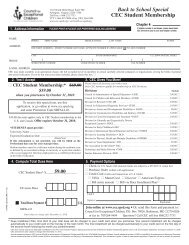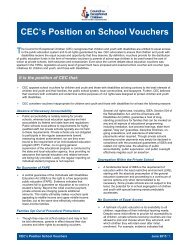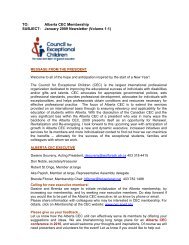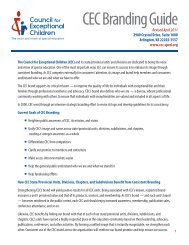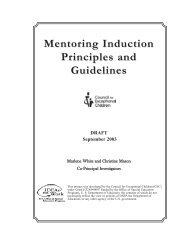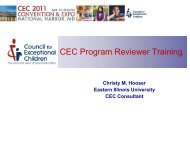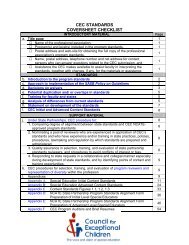What Every Must Know Special Educator - Council for Exceptional ...
What Every Must Know Special Educator - Council for Exceptional ...
What Every Must Know Special Educator - Council for Exceptional ...
Create successful ePaper yourself
Turn your PDF publications into a flip-book with our unique Google optimized e-Paper software.
Skills<br />
IGC10S1 Use local community, and state<br />
and provincial resources to<br />
assist in programming with<br />
individuals with exceptional<br />
learning needs<br />
IGC10S2 Select, plan, and coordinate<br />
activities of related services<br />
personnel to maximize direct<br />
instruction <strong>for</strong> individuals with<br />
exceptional learning needs<br />
IGC10S3 Teach parents to use appropriate<br />
behavior management and<br />
counseling techniques<br />
IGC10S4 Collaborate with team members<br />
to plan transition to adulthood<br />
that encourages full community<br />
participation<br />
<strong>What</strong> EvEry SpECial EduCator MuSt KnoW<br />
Proficiency<br />
Level<br />
Comments<br />
Proficiency Levels: N=Novice, B=Beginning User, P=Proficient, A=Accomplished<br />
In 2002, CEC made it policy that all special education<br />
preparation programs, whether traditional or alternative,<br />
should demonstrate their alignment with CEC<br />
standards through CEC per<strong>for</strong>mance-based review.<br />
There are currently two pathways to apply <strong>for</strong> CEC<br />
Program recognition, through NCATE and directly to<br />
CEC. In the United States, there are currently two government-recognized<br />
agencies to accredit teacher education<br />
programs: National <strong>Council</strong> <strong>for</strong> Accreditation of<br />
Teacher Education (NCATE) and the Teacher Education<br />
Accreditation <strong>Council</strong> (TEAC). Both of these agencies<br />
base their accreditation approaches on the importance<br />
of establishing teaching as a full and mature profession.<br />
However, the two are built on different concepts<br />
to achieve professionalism.<br />
From the NCATE perspective, the foundation of a<br />
strong profession is a shared body of specialized<br />
knowledge and skill based on research, and public confidence<br />
that professionals are fit to practice. Speaking<br />
<strong>for</strong> NCATE, Art Wise states that only a strong degree<br />
of consensus among practitioners and practitioner<br />
educators can build that confidence. NCATE is built<br />
on the premise that strong professions depend upon<br />
“collective organization,” and that accrediting bodies<br />
preparaTion program developers:<br />
CeC program reCogniTion<br />
in the “mature professions” have played a catalytic<br />
role as the repositories of the consensus about the professions’<br />
specialized knowledge and skill.<br />
Since 1977, NCATE has been accrediting teacher<br />
education programs using an inclusive model of collaborating<br />
with the respective professional associations<br />
representing the various professional disciplines (i.e.,<br />
English, Social Studies, Math, School Psychology) For<br />
almost 20 years, CEC has been the partner of NCATE<br />
representing the disciplines within the special education<br />
profession.<br />
Candidates preparing to work in schools as teachers or<br />
other school professionals know and demonstrate the<br />
content knowledge, pedagogical content knowledge<br />
and skills, pedagogical and professional knowledge<br />
and skills, and professional dispositions necessary<br />
to help all students learn. Assessments indicate that<br />
candidates meet professional, state, and institutional<br />
standards.<br />
NCATE Unit Standard 1<br />
In addition to requiring preparation programs to demonstrate<br />
that their candidates have a positive influence



